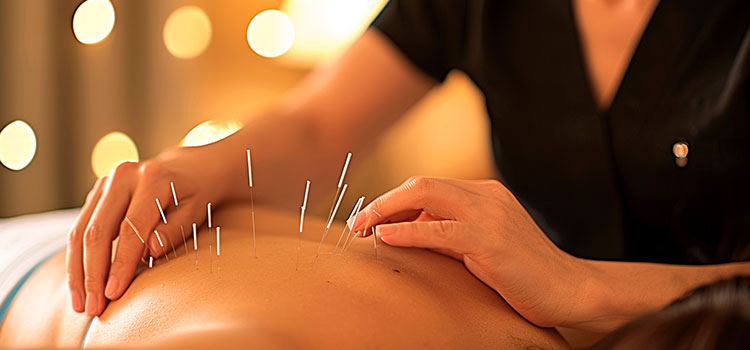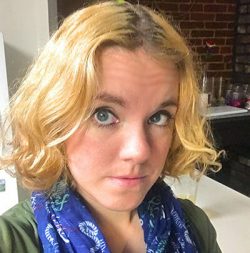In This Article
Guide to becoming an acupuncturist in Illinois

Acupuncture is an ancient holistic treatment that is based on the principles of Traditional Chinese Medicine (TCM). Acupuncturists use a holistic approach. They treat patients using techniques and observations that have been known for thousands of years combined with a modern understanding of biology and medicine. “Acupuncture helps the body increase blood flow to areas of concern,” said Al Ladesic, LAc,
Dipl. O.M and owner of Restorative Acupuncture and Wellness in Deerfield, Illinois.
“So, as an example, when someone comes in with lower back pain, I place a needle into a spot in the body that shares a brain area with the lower back. What that does is send a single signal through the nervous system and to the brain to wake it up.”
In Illinois, acupuncturists are licensed professionals who’ve earned at least a master’s degree. The state also requires certification exams.
Requirements for becoming an acupuncturist in Illinois
In Illinois, acupuncture certification is overseen by the Illinois Department of Financial and Professional Regulation (IDFPR). The first step to licensure in the state is earning at least a master’s degree in acupuncture from a school that’s accredited by the Accreditation Commission for Acupuncture and Herbal Medicine (ACAHM) or a similar accrediting body. Once you’ve earned your education, you’ll also be required to:
Educational programs that aren’t accredited by ACAHM or credentialing exams from bodies other than NCCAOM are approved by IDFPR on an individual basis.
Education and training requirements for IL
Aspiring acupuncturists will need to earn at least a master’s degree before they can work in Illinois. The state requires that programs are at least three years long and have a core curriculum length of at least 1,905 hours.
Illinois accepts degrees from all ACAHM-accredited schools, but it also considers degrees from other learning institutions. To be accepted for licensure, Illinois requires that degrees include specific coursework. These courses include:
Exam and licensing requirements for IL
Illinois accepts the national NCCAOM exam and Diplomate credential for licensure. To take the NCCAOM exam, you’ll need to send proof of your education to NCCAOM. You’ll also need to take a CNT course and pass an exam on its contents. You can take your CNT course and exam online.
The NCCAOM acupuncture exam is a 100-question computer-based exam. You’ll receive an instant pass or fail result on test day. You’ll then be able to access your full results online 7 to 10 days. NCCAOM will mail your credential to you in about six weeks. You can apply for licensure in Illinois once you receive your Diplomate in Acupuncture credential from NCCAOM.
Illinois also accepts equivalent credentialing exams. For instance, if you took the California acupuncture exam, you might be able to use your passing results to apply for licensure in Illinois. Similarly, testing from other countries that is equivalent to the NCCAOM exams might qualify for you an Illinois license.
Continuing education requirements
Illinois requires acupuncturists to renew their license every two years. Continuing education (CE) credits aren’t required for an acupuncturist’s first license renewal in the state but are required for all later renewals. Acupuncturists renewing their licenses for the second time and beyond are required to earn at least 30 hours of CE credit in each renewal cycle. Up to 23 CE credits can be earned online, but at least seven need to be earned in person.
Legal considerations for acupuncturists in Illinois
The IDFPR considers every application for licensure from new Illinois residents individually. Regulations for licensure can vary. The IDFRFP verifies that regulations at the location and time of licensure were equivalent to Illinois standards. To do this, IDFRP requires information from acupuncturists licensed in other states.
The exact information required can depend on the state you’re coming from and on when you were first licensed. In some cases, proof you’ve earned the Diplomate credential in acupuncture or oriental medicine from NCCAOM, or an equivalent credential, might be sufficient. Other relocating acupuncturists might be asked for:
Professional conduct and ethical guidelines
Illinois lays out specific standards for professional conduct in its Acupuncture Practice Act. The act defines acupuncture as:
“Evaluation or treatment that is effected by stimulating certain body points by the insertion of pre-sterilized, single-use, disposable needles, unless medically contraindicated.”
The act also points to specific acts of unprofessional conduct. These acts are ethical violations and could lead to a license being revoked or suspended. Mentioned acts include working outside the scope of practice, violating a patient’s privacy, false advertising and sexual misconduct, as well as fraud and other financial crimes.
Scope of practice
The Illinois Acupuncture Act also defines the scope of practice for acupuncturists in the state. The act states:
“Acupuncture includes, but is not limited to, stimulation that may be affected by the application of heat, including far infrared, or cold, electricity, electro or magnetic stimulation, cold laser, vibration, cupping, gua sha, manual pressure or other methods, with or without the concurrent use of needles, to prevent or modify the perception of pain, to normalize physiological functions, or for the treatment of diseases or dysfunctions of the body and includes the determination of a care regimen or treatment protocol according to traditional East Asian principles and activities referenced in Section 15 of this Act for which a written referral is not required.
In accordance with this Section, the practice known as dry needling or intramuscular manual stimulation, or similar wording intended to describe such practice, is determined to be within the definition, scope, and practice of acupuncture. Acupuncture also includes evaluation or treatment in accordance with traditional and modern practices of East Asian medical theory, including, but not limited to, moxibustion, herbal medicinals, natural or dietary supplements, manual methods, exercise, and diet to prevent or modify the perception of pain, to normalize physiological functions, or for the treatment of diseases or dysfunctions of the body and includes activities referenced in Section 15 of this Act for which a written referral is not required.”
Insurance and liability
There is currently no insurance requirement for acupuncturists in Illinois. However, having professional liability insurance can be a smart move for acupuncturists. This is true for all professionals in this field, but can be especially important for acupuncturists who are considering opening their own practices. The laws about insurance for small businesses will depend on your exact town and county in Illinois, so it’s a good idea to research local rules as you plan.
Working as an acupuncturist in Illinois
How much do acupuncturists make in Illinois?
Acupuncturists nationwide earned a median annual salary of $78,220 in 2023. The U.S. Bureau of Labor Statistics (BLS) doesn’t track acupuncture salaries in all states, and it doesn’t report a 2023 median for acupuncturists in Illinois. However, acupuncturist salary data in neighboring Wisconsin is available. Acupuncturists in Wisconsin earned a median annual salary of $62,440. As a rule, Illinois residents earn a higher average salary than residents of Wisconsin says World Population Rankings.
Finding employment opportunities
The BLS predicts an overall rise in jobs for acupuncturists. A growth of 5.3% is expected through 2032. Some of this can be tied to the overall demand for healthcare professionals nationwide. Acupuncturists and other holistic and natural medicine providers are also seeing increased interest in their services. In recent years, research has scientifically backed the use of acupuncture as a treatment for several conditions, leading even more people to the doors of providers.
“Acupuncture offers an alternative option that’s natural and free of risk and side effects, and I think that’s becoming increasingly important and very appealing for people.”
“There are about 50 million Americans, or about one in five who have chronic pain,” said Ladesic. “And, when you look at typical treatments, you’ve got medications and surgery. These are things with known risks and side effects. In 2020 alone, more than 40,000 Medicare Part D beneficiaries had an opioid overdose. Acupuncture offers an alternative option that’s natural and free of risk and side effects, and I think that’s becoming increasingly important and very appealing for people.”
Setting up a private practice in Illinois
The regulations for setting up a private practice can vary depending on where in Illinois you live. Local areas set their own rules and regulations surrounding fees, permits and other setup essentials. You can typically find this information online.
Staying up to date on industry developments and trends
It’s always a great idea to stay up-to-date on the latest trends and developments in your professional field. For acupuncturists in Illinois, joining an organization or association can also be a smart way to earn CE credits, find career opportunities and get connected with other natural health professionals.
These organizations can be good places to start:
- Illinois Society of Acupuncturists (ISOA)–The ISOA hosts a community forum and a job board for acupuncturists. They also host events and provide educational materials for acupuncturists and prospective patients.
- American Association of Acupuncture and Oriental Medicine (AAAOM)– AAAOM is a large and established organization that can help you stay connected in the field of Oriental Medicine.
- Asian American Acupuncture Association (AAAA) of Illinois–The AAAA is dedicated to Asian American Acupuncture professionals but welcomes the support and participation of acupuncturists of all ethnic and cultural backgrounds. The association offers a wealth of resources and is one of only two licensed CE providers based in Illinois.
Getting started as an acupuncturist in Illinois
The first step to a career in acupuncture is a strong educational foundation. A master’s level degree can help aspiring acupuncturists get started. The right degree programs can help you learn the knowledge and skills you’ll need to take the NCCAOM exam and to succeed in this healing role.
How to become an acupuncturist in your state
As you know, in most states, you need certification to earn licensure to become an acupuncturist. Here are in-depth explorations of what you’ll need to do in some key states:

With professional insight from:
Owner, Restorative Acupuncture and Wellness; Deerfield, Illinois
